Photo, above: Allen Osgood (left) and Stephanie Mertz (in white) at MHacks 6
 ArchHacks is a hackathon hosted at Washington University in St. Louis for students of all different backgrounds who are passionate about technology, design, and, most importantly, building things. ArchHack’s goal is to bring together more than 500 students from around the country for 48 hours of collaboration, problem solving, and making. With our sponsors and our focus on HealthTech, ArchHacks will provide a unique opportunity for students to work with resources and companies they cannot find anywhere else. Application deadline: Oct. 15; apply here
ArchHacks is a hackathon hosted at Washington University in St. Louis for students of all different backgrounds who are passionate about technology, design, and, most importantly, building things. ArchHack’s goal is to bring together more than 500 students from around the country for 48 hours of collaboration, problem solving, and making. With our sponsors and our focus on HealthTech, ArchHacks will provide a unique opportunity for students to work with resources and companies they cannot find anywhere else. Application deadline: Oct. 15; apply here
ArchHacks was the vision of Allen Osgood and Stephanie Mertz, two juniors studying computer science at WashU. Let’s hear what they have to say about their experiences with hackathons, HealthTech, ArchHacks, and more!
What was your first hackathon experience like?
Allen Osgood: So… great story. Stephanie and I decided last minute that we should go to MHacks, and so we looked at flights, but that just wasn’t going to happen. So she and I drove 8 hours as a road trip from St. Louis to Ann Arbor to spend 48 hours coding — it sounded like fun at the time.
When we got to MHacks, I was just amazed. There were 1,500 people wandering around trying to find partners and projects, clutching nothing but a small backpack and a laptop, preparing themselves for some of the most creative non-stop hacking I’d ever seen. From that moment on, I was hooked. When Stephanie and I starting driving back (after she took a solid 2 hour nap), ArchHacks began to take shape. We knew then and there that we had to make this a reality at our school. So we have!
Where’s your favorite place in St. Louis to hack?
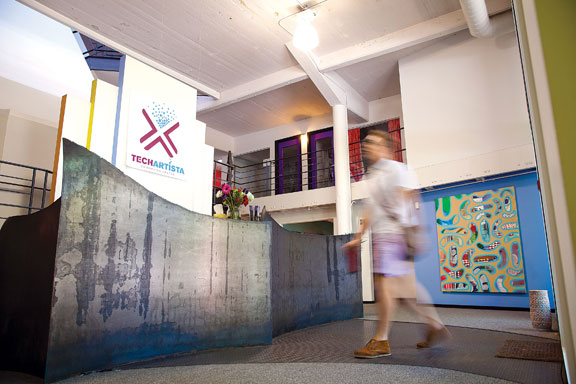
Stephanie Mertz: I would have to say TechArtista. It has such a cool fun vibe and is always filled with interesting, friendly people. This place really has the perfect balance of a work and social environment. This co-working space was started by two WashU alumni who are incredibly supportive and involved in the WashU tech community.
Why do you think hackathons are important?
Stephanie Mertz: Hackathons are important because through them, you learn how to build and create things that matter. You’re also able to meet all types of different people in tech, whether they be sponsors or students at other universities.
Allen Osgood: I think hackathons are important because they inspire people. I met some of the most incredible engineers at MHacks just hanging around. Seeing what was possible made me want to get better. It showed me how much there was still to learn.
What inspired you to make the theme of this hackathon “HealthTech”?
Stephanie Mertz: I was at a hackathon and everyone around me was so talented and making really interesting things, but they were making things that didn’t really solve any real problems. WashU’s last hackathon did not have a theme, but because Trip Advisor was our top sponsor, almost all the projects were travel themed. This year we wanted to pick sponsors intentionally to incentivize participants to make projects that solve real problems. HealthTech is a broad theme that includes topics like fitness, nutrition, and mental health, just to name a few. Projects are also not restricted to HealthTech — there are just some awesome prizes and a ton of mentors for those categories.
Allen Osgood: We spent a lot of time trying to think about how we could make this happen. What could we do to bring together a massive group of people? What would make us special? We were in a meeting with the WashU Dean of Engineering, and he started talking about the Medical School and how they might be a good partner. There and then, it dawned on us — HealthTech: the ultimate intersection of St. Louis talent, regional corporate interest, and coder sparsity. We realized that if we could bring together clinicians and coders, we could do some amazing things.
Were you interested in HealthTech before starting ArchHacks?
Stephanie Mertz: Honestly, I didn’t even know what HealthTech was before ArchHacks. Our Engineering Dean suggested the theme and I didn’t like it at first because my mind immediately jumped to needles and medicine. I’m super squeamish, if you can’t tell. But as I did some research, I found out that HealthTech is really just tech used for cool purposes, like figuring out how to do distributed computing on large data sets, where the data sets are from genomic sequencers in labs and the results are used to help patients. The engineers are just focusing on cool tech projects that matter. We’re making a video series that will hopefully give a better idea of the kinds of tech these type of companies make.
What makes ArchHacks different than the other hackathons?
Stephanie Mertz: Prizes are for thinking about real problems and there are tons of mentors in different fields available to learn from. At other hackathons, prizes are for using certain technology, but at ArchHacks, we want to help you solve new problems. ArchHacks is special not only for its theme, HealthTech, but also because unlike most other hackathons, our team is extremely diverse. We have students planning this hackathon from all different areas of study coming together because they are interested in Computer Science and want to make this event a success. I think that’s really special because it shows that CompSci is an important field that influences so many different people, and it can have an impact no matter what area you pursue.
Allen Osgood: Our goal is to build projects that matter. Any project you work on here — from robotics to apps — is going to make a difference to somebody. We’re bringing together people who have never interacted with each other before. Students, clinicians, companies, and government officials are coming together to show the impact they can have — even in just 48 hours. And…Stephanie and I are organizing it!
What are some of the best hacks you’ve seen?
Allen Osgood: Probably a fully mobile robotic arm that used a laser pointer as a cat toy. Not the most useful, but really cool.
Most embarrassing moment at a hackathon?
Stephanie Mertz: Definitely shamelessly begging for an extra t-shirt from Wolfram for my friend who couldn’t come to the hackathon. Worth it, because she’s working there this summer (must have been the shirt).
Allen Osgood: Is there an all of them answer? Probably showing how midwestern I am and winning the corn hole tournament last year.
Okay, last question: when you’re not hacking, what do you like to do?
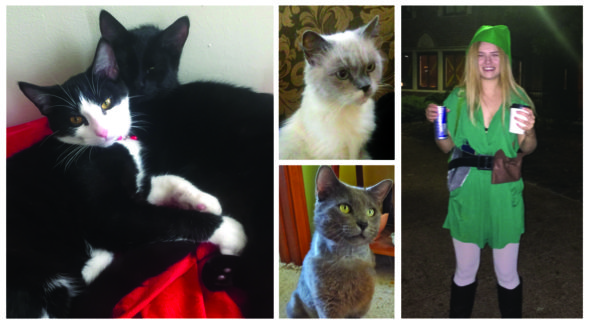
(Cat Names Left: Charlie and Cheesecake, later renamed Cannoli; Top Right: Elvira, aka Fluff Ball; Bottom Right: Coal)
Stephanie Mertz: When I’m not hacking, I foster cats! I also enjoy putting together funny (and punny) costumes (that’s me as a “Hyper” Link — get it?!)
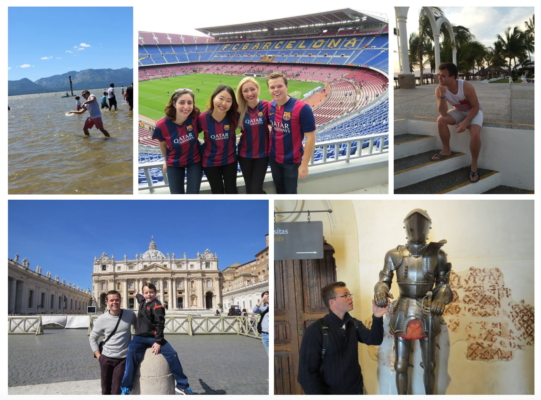
Allen Osgood: When I’m not hacking, I travel! I went abroad last Spring to Madrid, Spain and tried to see as much of Europe as possible in 4 months. I’m also a big soccer fan, so getting to see Messi and Ronaldo play in their home stadiums was amazing!
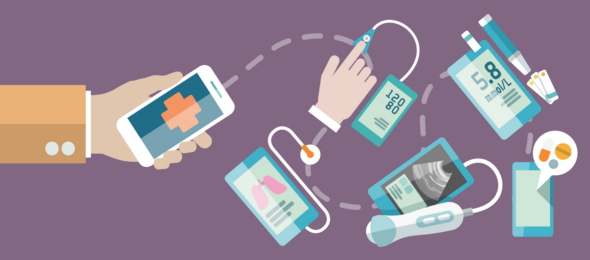




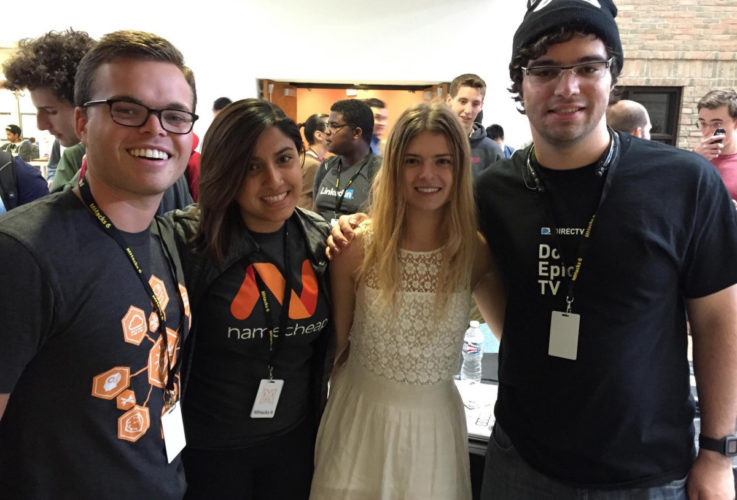
 ArchHacks is a hackathon hosted at Washington University in St. Louis for students of all different backgrounds who are passionate about technology, design, and, most importantly, building things. ArchHack’s goal is to bring together more than 500 students from around the country for 48 hours of collaboration, problem solving, and making. With our sponsors and our focus on HealthTech,
ArchHacks is a hackathon hosted at Washington University in St. Louis for students of all different backgrounds who are passionate about technology, design, and, most importantly, building things. ArchHack’s goal is to bring together more than 500 students from around the country for 48 hours of collaboration, problem solving, and making. With our sponsors and our focus on HealthTech, 


